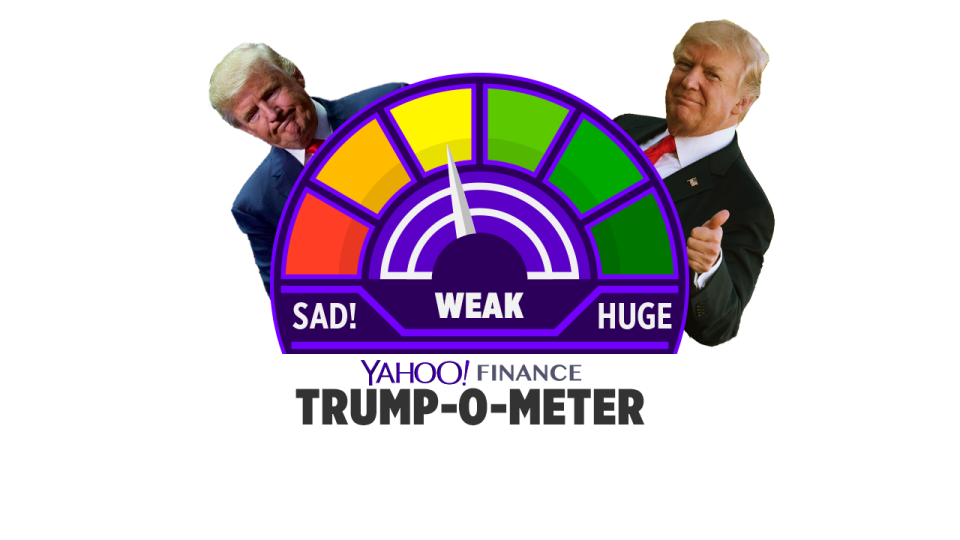This week in Trumponomics: A smackdown with HOG
It’s a Battle of Big Brands in Trumponomics this week.
President Trump is betting his personal brand will best another big name: the motorcycle maker Harley-Davidson, whose ticker symbol is HOG. Trump attacked Harley this week as the company tried to mitigate the damage from the trade wars Trump has kicked off. The spectacle pits an “America First” president against an all-American brand whose profits would suffer if it actually did what Trump wants.
When Trump imposed tariffs on steel and aluminum imports from most countries earlier this year, the 28 nations of the European Union responded by slapping tariffs on a select basket of US imports to Europe, including Harley bikes. The tariff hike would add $2,200 to the cost of a Harley in Europe. Instead of eating that cost, or trying to pass it on to customers, Harley said this week it will shift production of Europe-bound bikes from US plants to an overseas factory, probably one it operates in Thailand. That way, Harley can ship bikes from Thailand to Europe without paying the hefty new tariff on US imports.
Trump characterized Harley’s decision as a personal insult, and said the company “should stay 100% in America.” He has attacked other prominent American companies, of course, including Amazon, Ford, Carrier, Boeing and probably a dozen media outlets. But Trump’s meddling with a public company that is obligated to act in its shareholders’ interests—not in the president’s—is abusive government overreach nonetheless. For that reason, this week’s Trump-o-meter reads WEAK, our equivalent of a C-minus.

The Harley drama encapsulates a lot of the trade tension that has arisen in recent years and given Trump a reliable cauldron of outrage he can dip into over and over. Harley has been struggling with declining sales since revenue peaked at $6.2 billion in 2014. To offset slowing sales in the states, Harley, like many other companies, has expanded into overseas markets. But bikes built in America by relatively expensive American labor aren’t necessarily affordable in other markets. Plus, some emerging economies, including India, still charge high tariffs on imports. So Harley has built two overseas plants, in India and Thailand, to manufacture bikes for some foreign markets.
If Trump ran the company, maybe he’d say, nope, no way, we will only build bikes in America. But then he’d have to figure out how to offset a big cost disadvantage against competing bikes in foreign markets. It takes incredible brand cachet to convince consumers to pay a premium for your product, when the competition is 10% or 25% or 40% cheaper. Harley has been able to pull that off for a considerable amount of time. But weakening US sales indicate it’s not working anymore, at least not well enough to keep sales growing.
Harley could stay 100% American, as Trump wants, and simply accept declining sales. But who would want to own the stock? As is, the stock has fallen 23% during the last 5 years, while the S&P 500 has risen by 68%. So HOG has underperformed the market by a startling 91% – and that’s with a turnaround plan in place. There’s nothing all-American about that. If the CEO were to say, forget it, whatever, we’re just going to let sales fall, and become more and more uncompetitive, there’d be no Harleys to make before long. That has already happened to Victory Motorcycles, a smaller Harley competitor, which shut down last year.
Trump and some union members who will lose their jobs as Harley consolidates have accused the company of using the European tariff hike as a smoke-screen to shift production overseas simply so it can ditch costly American workers. It’s possible. But it still leaves the question of how Harley is supposed to survive as demand falls and costs remain high. If you’ve got a better idea than shipping some production overseas, apply to be CEO.
Trump’s attack on Harley is probably meant to dissuade other companies from moving overseas as well, since they have to know they’ll be in Trump’s crosshairs. But Harley probably knew that too, and made the move anyway. Worth noting: The company didn’t “announce” the production shift, but disclosed it in a filing with the SEC, which public companies are required to do when they plan a material change. Harley would no doubt be delighted if nobody had noticed. The real incentive for other companies that need to shift production, to avoid tariff punishment, will now be doing it more sneakily than Harley.
Trump’s love of tariffs comes from the simplistic belief that making imports more expensive will boost demand for competing domestic products. But tariffs generate all kinds of unintended consequences, while giving government way too much say in how companies should operate. Trump seems comfortable with that, as he tweets his orders about where companies should set up shop. What he doesn’t seem to realize is he’s also ordering them to lose money.
Confidential tip line: [email protected]. Click here to get Rick’s stories by email.
Rick Newman is the author of four books, including Rebounders: How Winners Pivot from Setback to Success. Follow him on Twitter: @rickjnewman
Follow Yahoo Finance on Facebook, Twitter, Instagram, and LinkedIn
